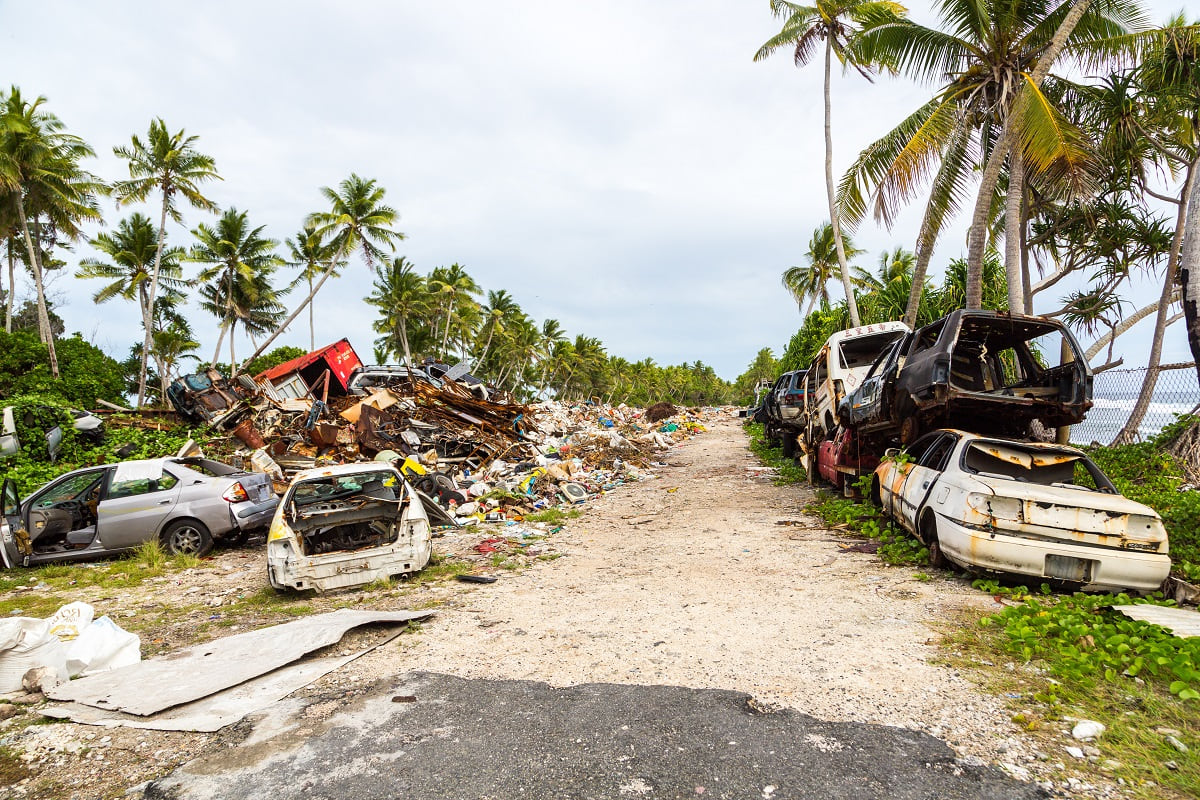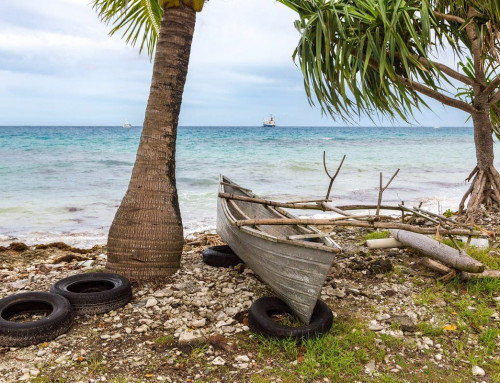Rising sea levels are threatening the existence of several Pacific nations, particularly Tuvalu. The problem is not new: for two decades now, scientific experts and islanders have been alerting the international community to the danger of the archipelago’s disappearance by 2050. While waiting for exile, Tuvalu is facing climate change with weariness and incomprehension.
Tuvalu and Climate Change
The industrialization of the world, and perhaps even more so its energy and food consumption patterns, have led to an increase in greenhouse gas emissions over the last 50 years. Climate change is happening right now: temperatures are rising, land is becoming arid and polar glaciers are collapsing. Slowly but inexorably, sea levels are rising. At an average of four meters above sea level, the Tuvalu archipelago is the first nation of the 21st century to be threatened with extinction.
There are two assumptions before we accept that the Tuvalu Islands are on the brink of extinction. Firstly, the process is not irreversible. It is possible to elevate the land and protect it with an ingenious system of dikes. However, this can only be achieved with the financial support of the wealthiest states in the international community. At the same time, the latter must drastically revise their industrial model. Secondly, if nothing were to be done, the Tuvalu Islands would not be swallowed up overnight: this would be preceded by decades of long, slow agony.
Methodology of a Disaster
Tuvaluans are no longer waiting for the deluge: they are living it every day. Climate change and rising sea levels are causing tides to become ever stronger and deeper. Salt water floods scarce farmland, preventing present and future harvests. When the sea retreats, it leaves large salt crusts in its wake, as well as heaps of garbage – all of which has been carelessly dumped into the world’s oceans, ending up on the beaches of an archipelago that is a victim of pollution from which it is an absolute stranger.
To escape the cataclysms and their devastating effects, the inhabitants of the outer islands migrate to the capital. At least together, solidarity can work better. In recent years, the population of Funafuti has exploded. Absolute numbers remain low, but on the scale of this small territory, density brings new problems: water rationing, access to foodstuffs, in short the question of survival for children, elders, women and men.
To meet their basic needs, Tuvalu relies on imports, financed in part by the granting of maritime zones to large industrial fishing trawlers from other interested nations. As a result, fish are becoming increasingly scarce. This is yet another catastrophe, given that Tuvaluans traditionally feed on fish products. Not to mention the threat to local biodiversity.

Tuvalu’s Response to Climate Change: Exile
The Tuvaluan government has stepped up its efforts to curb the process. Mangrove plantations on several atolls are here to protect the islands from devastating tides and preserve biodiversity. A drop of water in a rising ocean. As we all know, Tuvalu does not have the means to halt the process on its own. Unfortunately, despite continuous interventions by Tuvaluan emissaries, the international community understands neither the urgency nor the value of a paradigm shift.
Tuvaluans are well aware of the gravity of the situation. The younger generations are trying to emigrate in search of a less anxiety-provoking future. Among the elders, the land is gradually being eaten away by the waves, and people are talking about the past. In a traditional, conservative society, leaving one’s island and family is perceived as a heartbreak. When the land becomes uninhabitable, the entire population will have to take to the roads of exile: they will become climate refugees. To where?
In November 2023, a partnership agreement provides for relocation and resettlement on Australian territory. The agreement is not free, as Australia will increase its sphere of influence in the South Pacific, reclaiming territorial waters. Tuvalu will then lose its sovereignty and become a virtual trustee state. However, better alternatives exist on the island of Kioa in Fiji or in New Zealand, as these lands are culturally Polynesian.
Building a Virtual Nation
What does the future hold for the Tuvaluan nation? Will the population explode in an ever-growing world? or will they be parked on a new territory over which they have no rights? With the prospect of losing their land, Tuvaluans also risk losing their cultural roots and national cohesion. What can 12,000 individuals hope for from a nation abandoned to its fate in the midst of general indifference?
Themes of identity and memory are the order of the day. In 2022, Simon Kofe, Tuvalu’s Minister of Foreign Affairs, announced the creation of a digital cloning of the Tuvalu Islands and their 3D modeling. The announcement was a spectacularly radical but logical solution. In the future, Tuvaluan exiles will be able to remember their origins and their land. Sad compensation.
A Warning to the World
The disappearance of the Tuvalu archipelago would be both a profound disappointment for the international community and a bad signal to other nations threatened by rising sea levels. If such a tragedy were to occur, future generations would have to raise the question of responsibility and keep the memory alive. Many humanist, cultural and/or ecological associations are fighting to save the islands of Tuvalu, their unique culture and their inalienable right to exist. We invite you to get in touch with one of them.



Leave A Comment